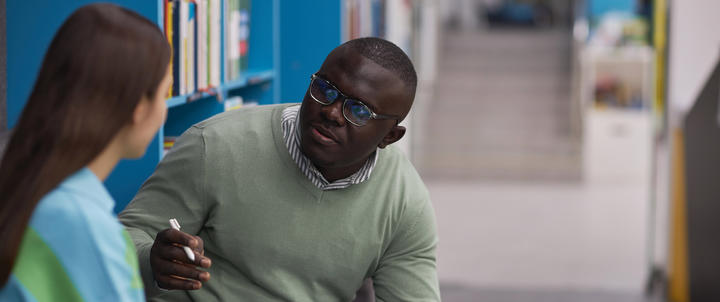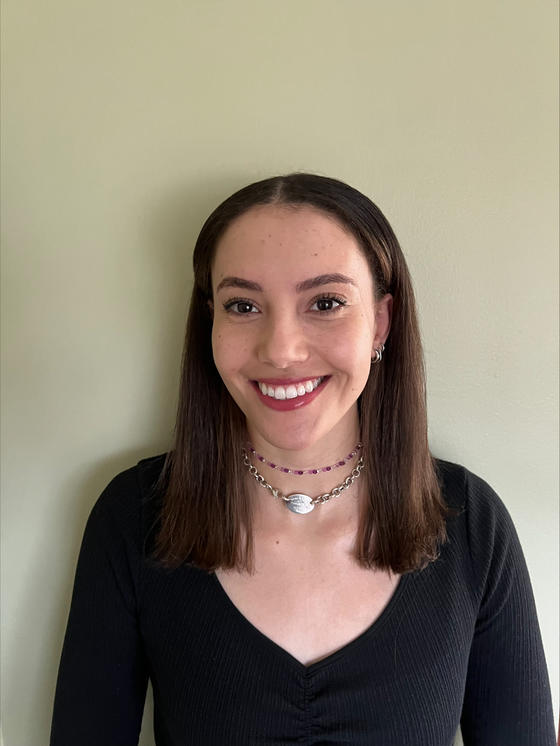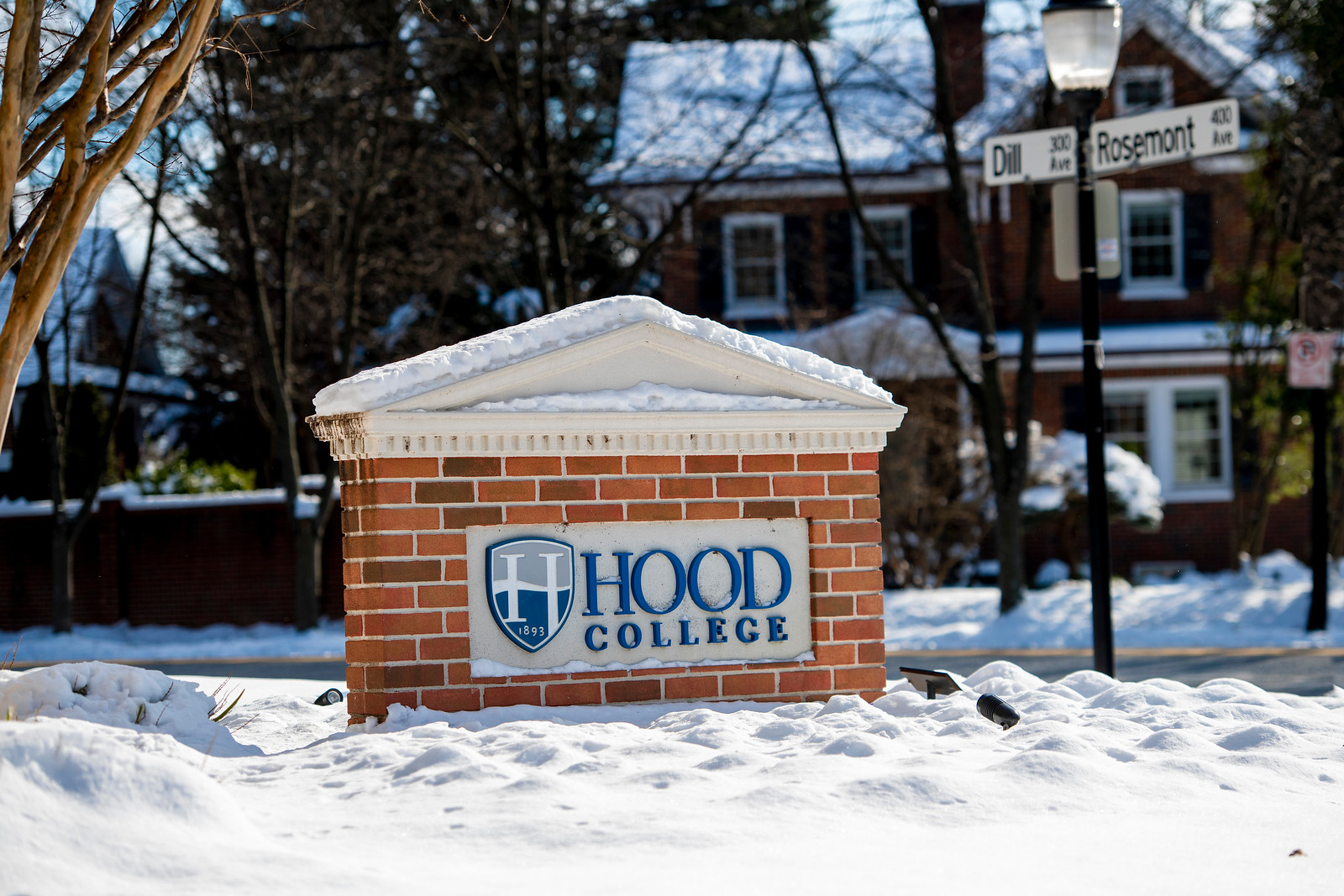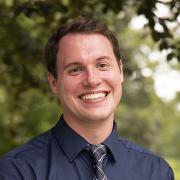
About this Program
The CACREP-accredited school counseling master’s program prepares you for certification as a school counselor in Maryland. Courses can also fulfill requirements for professional counseling licensure (LCPC) in Maryland.
Program Overview
The school counseling M.S. program is designed to develop your professional identity as a certified counselor. You will complete rigorous academic coursework and field training according to the exceptional standards set forth by the Council for the Accreditation of Counseling and Related Education Programs (CACREP).
As part of The Ruth Whitaker Holmes School of Behavioral and Health Sciences, you will gain firsthand experience in real-world school settings and become equipped with the advanced skills and knowledge necessary for school counseling certification and/or professional counseling licensure in Maryland. Our expert faculty are working counselors who provide individualized attention and networking opportunities. The school counseling track offers the unique opportunity to cultivate additional expertise in the disciplines of thanatology or trauma, crisis, grief and loss.
View Hood Talks Trauma and Society webinar with Dr. Shaine.
Tuition & Fees Funding Opportunities Counseling Brochure
Application Deadlines
Spring semester: October 1 (interviews Oct 22 and 25)
Fall semester: February 1
Accreditation Status

The 60-credit program was first accredited by the Council for the Accreditation of Counseling and Related Education Programs (CACREP) in summer 2019 and received an extension of accreditation through October 1, 2027.
Methods of Instruction
Late afternoon, evening and weekend classes accommodate working adults. Courses may be taken on a full-time or part-time basis; students are encouraged to consider how they will balance the requirements of coursework and practicum/internship with other commitments.
Students should be aware that the clinical, occupational and emotional demands of practicum (COUN 596) and internship (COUN 597 and COUN 598) can make simultaneous full-time employment challenging. Few sites offer evening and weekend hours, and students are expected to be as flexible as possible. Students receive extensive support from faculty in identifying and securing a site; however, placements and specific scheduling needs are not guaranteed. For students in the school counseling specialty program, site assignments are formalized and are facilitated between the school counseling program coordinator and the coordinators for counseling services at schools throughout Maryland. Applicants should speak to faculty for further information.
Degrees Offered
- MS
Department Offering
Related Graduate Programs
Program Social Media
Are you ready to go further?
Admission to the school counseling specialty master’s program requires a minimum undergraduate GPA. of 3.0. If the GPA. is below 3.0, the applicant may submit GRE scores for possible consideration. Undergraduate coursework in psychology is strongly recommended.
Individuals applying to the school counseling master's program are required to submit:
- The online application
- Official e-transcripts from all post-secondary schools attended (should be sent via Parchment to Hood Graduate Admission or emailed to gofurther@hood.edu).
- A personal statement describing factors that influenced the decision to apply to Graduate School and how this program will facilitate fulfillment of the applicant’s professional goals
- In the counseling profession, a professional is expected to recognize and appreciate individual differences. Write about an experience (or experiences) you have had working with people different than yourself? What strengths and limitations do you see in your ability to recognize and appreciate individuals who hold beliefs and/or values that differ from your own?
- A résumé or curriculum vitae
- Two letters of recommendation (one academic and one professional preferably)
All application materials should be submitted by the Counseling application deadlines.
Applicants will be contacted to schedule an interview, with online/video interviews used for applicants who live more than two hours from campus.
* Please note that a maximum of 9 credits can be transferred into the program. Please review the full graduate transfer credit policy in the College catalog.
Matriculation Requirements. The Master of Science in Counseling, School Counseling Track, is a 60-credit program. Students must maintain a 3.0 grade point average (GPA) in order to be in good academic standing and eligible for grade completion. If a student’s GPA falls below 3.0, that student must restore their GPA to a 3.0 within 9 credits completed from the term in which the GPA fell below a 3.0. See the Grade Expectations and Appeal Policy section within the Student Handbook for more information. All coursework and degree requirements must be met within seven years of enrolling in the first course at Hood College. Students may transfer up to 9 credits from another institution, if approved by the academic adviser and program director. Failure to receive approval for course substitutions prior to enrollment may result in a delay in program completion.
In addition to coursework, students are expected to demonstrate a range of skills in the areas of academic competence, counseling skills and appropriate interpersonal behavior. These skills must be mastered in order to successfully complete all program requirements. Students who do not meet these expectations will be called upon for remediation and, in cases of gross misconduct, dismissed from the program. Failure to successfully complete a professional development or remediation plan is also means for dismissal. See the Student Retention, Remediation, Appeal and Dismissal Policies section within the Student Handbook for more information.
Program of Study. The program of study (see Course Requirements section below) outlines required coursework for completion of the 60-credit program. Program completion requires students to take 27 credits of core coursework, 12 credits of coursework related to school counseling and 12 credits of electives. Students must also complete a 700/hour practicum and internship.
Additionally, all school counseling students are required to document completion of a 3-credit course in special education, either at the undergraduate or graduate level. This requirement from the Maryland State Department of Education (MSDE) went into effect in October 2020. Once documentation of course completion is submitted to both the school counseling program coordinator and the Hood College registrar, students will receive a “stamp” on their transcript, which signifies that the requirement has been completed prior to graduation. While the faculty are willing to support students with program planning, it is the student’s responsibility to make sure they complete the requirements necessary to successfully complete the program.
New Student Orientation. During the first semester of enrollment, all students are required to attend the Hood College Graduate School and Counseling Program New Student Orientation. During this orientation, students will meet core faculty and receive information and policies related to the counseling program and curricula, students’ ethical and professional obligations, personal growth expectations as counselors-in-training and eligibility for licensure/certification.
Faculty Advisement. Students will have an assigned faculty adviser at all times during the program. For students in the school counseling specialty, this will typically be the school counseling program coordinator. Students will develop a planned program of study with their adviser during the first semester of enrollment and meet with their adviser at least once per year to review their progress and development. In addition to enrollment decisions, advisers assist students in identifying opportunities for professional involvement, activities appropriate for students, expectations of students, policies and procedures of both the College and counseling program, and assist with other relevant questions.
Faculty advisers review and approve all student registration information for each semester. Students are strongly encouraged to work directly with their adviser in regard to course enrollment.
Assessment of Students. Each student’s progress throughout the program is assessed by examining student learning in relation to a combination of knowledge and skills. This assessment process includes an evaluation of student learning in relation to eight core areas of counseling and three core areas related to each student’s specialty area (e.g., clinical mental health counseling or school counseling). These areas directly correspond to the Hood College Counseling Program Objectives (see M.S. Counseling, School Counseling Program Objectives section below). To measure student development towards these core areas, Key Performance Indicators (KPIs) are evaluated regularly (typically three times) as students advance through the program curricula. KPIs are primarily assessed via Key Assignment Performance Indicators (KAPAs), which are included as course assignments. Students and faculty use this information to help students develop the appropriate knowledge and skills they need to enter the counseling profession. Identified areas of strength and deficiency will be reviewed with students and, as needed, professional development plans assigned. Information from this assessment process is also used, in aggregate form, to identify programmatic trends, systematically assess program objectives and as part of the program’s annual review.
Professional Dispositions. In addition to core knowledge and skills related to professional counseling, students are also assessed at different points of the program based on professional dispositions they need to enter into the counseling profession. Professional dispositions are assessed by students, faculty and (when applicable) site supervisors as part of the Comprehensive Evaluation of Student Progress (CES-P). Counseling dispositions and professional behaviors are based on the CACREP standards for entry-level counseling professionals (CACREP 2016, Section 2.F; Section 5.C; and Section 5.G) and the American Counseling Association (ACA) 2014 Code of Ethics. Identified areas of strength and deficiency will be reviewed with students and, as needed, professional development plans assigned.
Student Evaluation. Students have regular, systematic opportunities to formally evaluate program faculty and site supervisors. Course evaluations are administered through the Hood College Office of Institutional Research and Assessment at the end of each class. Students enrolled in COUN 596 (Practicum), COUN 597 (Internship I) and COUN 598 (Internship II) will complete a site supervisor and faculty supervisor evaluation. This information is used at both the course and programmatic level, along with student assessment data, to help program faculty reflect on aspects of the program that work well and those that need improvement. Completion of all assessment data (course evaluations, site supervisor evaluations and the CES-P) is integral to informing programmatic and curricular decisions. See Appendix A within the Student Handbook for a copy of the CES-P (student version).
Note: Upon graduation from the program, graduates and employers of program graduates will be asked to complete a survey designed to evaluate the program’s overall effectiveness as related to the Hood College Program Outcomes.
CACREP Vital Statistics
The curriculum is designed to conform to standards set by the Council for the Accreditation of Counseling and Related Education Programs (CACREP) and, for students in the school counseling track, the Maryland State Department of Education (MSDE).
Upon completion of the Hood College Master of Science in Counseling program, graduates will be able to:
- Articulate knowledge of the counseling profession and ethical practice.
- Integrate social and cultural diversity competencies into counseling practice.
- Apply theories of human development across the lifespan to counseling practice.
- Demonstrate knowledge of theories and strategies for addressing career development.
- Apply knowledge of evidence-based prevention and treatment theory and techniques to assist clients achieve their mental health goals.
- Demonstrate knowledge and expertise in group counseling theory and practice.
- Integrate knowledge of test theory with the practice of assessment in counseling.
- Demonstrate the ability to apply scholarly and research literature to counseling practice and program evaluation.
Upon completion of the school counseling track, graduates will be able to:
- Articulate foundational knowledge of the school counseling specialty, including the history of school counseling, models of school counseling programs, and models of school-based collaboration and consultation.
- Articulate a grasp of the contextual dimensions of school counseling, emphasizing the responsibilities of school counselors as leaders, advocates, consultants and multidisciplinary team members across a wide variety of practice situations.
- Apply school counseling strategies, interventions, and techniques to promote the academic, career, and personal/social development of all P-12 students.
Our CACREP Vital Statistics Report for 2021-2022
Our Program Advisory Board Meeting Presentation for 2022-2023
Specific Demographics & Program Level Data
Student Handbook and Manuals
The information included below is useful to prospective, current and even graduates in that it provides you with a plethora of information. Please note, however, these handbook/manuals do not contain the complete and exact text of all rules, regulations, policies and procedures that relate to graduate students at Hood College. The Hood College catalog also contains policies, procedures and information about services for graduate students and should be used in conjunction with this program-specific handbook.
Student Handbook
The Hood College Counseling Student Handbook includes a detailed description of program mission and program objectives; faculty information; plan of study for clinical mental health counseling and school counseling tracks; matriculation requirements; and program and institutional policies (including expectations of students and policies related to endorsement, academic appeals, retention and remediation). The handbook also provides information about licensure and certification; professional counseling organizations; and opportunities for professional involvement. Students will find a long listing of recommended resources for personal counseling at the end of the Student Handbook. We encourage all students to go through the handbook multiple times throughout the program, as it provides valuable information at different points in your learning.
Practicum & Internship Training Manual
The purpose of the Practicum & Internship Training Manual is to provide detailed information about the field experience requirements within the counseling M.S. program at Hood College. Students, field site supervisors, agency representatives and faculty instructors involved in the practicum and internship process should all familiarize themselves with the content of this manual and bring any questions to the practicum and internship coordinator (PIC). It is the responsibility of each student embarking on practicum and internship to be aware of the requirements, policies, and procedures guiding these experiences, as outlined in this document. Additional questions and clarifications can be addressed with Professor Amber Samuels, Ph.D., practicum and internship coordinator (samuels@hood.edu).
Practicum & Internship Manual (2021-2022)
Nine core courses (27 credit hours) provide a common body of knowledge for all students in the program. These courses provide a solid foundation for further specialized study in Clinical Mental Health Counseling.
| COUN 500 Human Development as a Lifelong Process | 3 |
| COUN 501 Professional, Legal, and Ethical Responsibilities | 3 |
| COUN 502 Social and Cultural Foundations of Counseling | 3 |
| COUN 503 Lifestyle and Career Development | 3 |
| COUN 504 Counseling Techniques | 3 |
| COUN 505 Group Dynamics, Processing, and Counseling | 3 |
| COUN 506 Research and Program Evaluation | 3 |
| COUN 511 Theory and Principles of Counseling | 3 |
| COUN 534 Tests and Measurements | 3 |
| TOTAL CREDTIS | 27 |
Required Specialty Courses
Four courses (12 credits) provide further specialized knowledge, skills and training necessary to address a wide variety of circumstances within the context of School Counseling.
| COUN 540 | Foundations of School Counseling | 3.0 |
| COUN 541 | Program Planning, Management and Evaluation of School Counseling Programs | 3.0 |
| COUN 542 | Collaboration, Consultation and Supervision | 3.0 |
| COUN 543 | Counseling Youth | 3.0 |
| Total Credit Hours: | 12.0 |
Practicum and Internship Courses (Required)
These courses provide professional practice opportunities for students to learn to apply theory and develop their counseling skills under supervision.
COUN 596 - Practicum *Practicum includes 100 hours total (40 hours direct service) at site | 3 |
| COUN 597 - Internship I | 3 |
COUN 598 - Internship II *Internship I & Internship II includes 600 hours total (240 hours direct service) at site | 3 |
| TOTAL CREDITS | 9 |
Electives
Students will select elective courses totaling 12 credits that will allow them to also complete (if desired) a 12-credit graduate certificate program currently offered by the Department of Psychology in Thanatology. School Counseling students may also take courses required for Maryland licensure as their electives courses. The certificate program provide students with the opportunity to gain specialized expertise in working with clients who are terminally ill/bereaved and the licensure courses allow students to meet coursework requirements towards a clinical professional counseling license. Please inquire with your faculty adviser or the program director for more details.
| COUN 507 Trauma & Crisis Intervention | 3 |
| COUN 520 Introduction to Thanatology | 3 |
| COUN 521 Grief and Loss | 3 |
| COUN 523 Dying & Principles of Care for the Dying | 3 |
| COUN 528 Developmental Perspectives in Thanatology | 3 |
| COUN 530 Alcohol and Drug Counseling* | 3 |
| COUN 531 Diagnosis and Psychopathology* | 3 |
| COUN 532 Advanced Counseling Techniques* | 3 |
| COUN 533 Marriage & Family Counseling* | 3 |
| COUN 575 Independent Study | 1-3 |
| COUN 590 Teaching Assistantship | 1-3 |
| COUN 595 Independent Research Project | 3 |
| COUN 599 Special Topics in Counseling | 1-3 |
| TOTAL CREDITS | 12 |
* Required for Maryland licensure
Specialization Options
A student who wishes to earn master’s degrees in both and Clinical Mental Health Counseling and School Counseling would be required to complete all specialty courses and a 600-hour internship within both the first and second specializations. Additional state requirements for licensure eligibility in the second specialization may apply.

The National Board for Certified Counselors (NBCC) is the premier credentialing body for counselors, ensuring that counselors who become board certified have achieved the highest standard of practice through education, examination, supervision, experience and ethical guidelines.
The Hood College counseling program continues to participate in NBCC’s National Certified Counselor (NCC) Application Options for Participating Universities. Students in participating programs, who are in the final two semesters of their master’s programs, have a unique opportunity to begin the application process to become an NCC prior to graduation. It should be noted that the NCC credential does not take the place of state licensure.
Counseling students who have questions or are interested in participating in either the fall or spring application cycle with NBCC should contact Dr. Erik Messinger for more information. The counseling program director will also share information about the application cycle on the counseling program’s Blackboard page. Eligible students should follow the instructions outlined on Blackboard in full to be considered for the current application cycle. Eligible students who do not complete the instructions in full will be considered for the next application cycle. More information about the NCC program can be found here. NBCC Foundation also has several scholarships specifically for counseling students.
24 Months
Average Completion Time
60 Total Credits
Program Contact

Program Director, School Counseling

Director of Graduate Admission

3MT Winner Spotlight | Bryan Goodman
"After I spoke with members of the Hood community, I felt as though I could truly gain perspective and grow at Hood College."

ALTY Student Spotlight | Amanda Tapscott
"My older sister went to Hood, so it always felt safe and familiar. I also lived nearby and wanted to go to a smaller, local school in hopes of receiving a more direct, personalized education closer to my family. I stayed with Hood for graduate school for similar reasons. Hood just feels like home."

ALTY Student Spotlight | Ana-Sophia Benson '22
"School counselors are the first mental health professional that students will encounter in life. We can guide them through their social/emotional, academic and career development as they move through the public education system."






